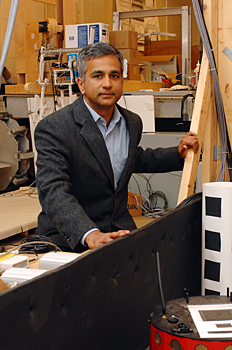The Humboldt is one of the top research awards given by the German government to renowned scientists and scholars from throughout the world. It recognizes the lifetime achievements of the recipients.
The award, presented to 100 senior scientists annually, provides funding to enable recipients to spend time in Germany studying with counterparts in their various research fields.
“I was very surprised, and also very honored, to receive this award,” Agrawal, who conducts internationally recognized research in robotics, said.
Oliver Sawodny, a professor at the University of Stuttgart, one of the premier technical universities in Germany, nominated Agrawal for the award. Agrawal plans to visit Germany this summer, and will spend periods of time there over the next two years while still teaching and directing work at his research laboratory at UD.
The laudation from his hosts, Sawodny and Lothar Gaul, also a professor at Stuttgart, states, “Agrawal is internationally recognized for his outstanding research in the area of methods based on differential flatness for non-linear systems. He has made important contributions to the systematic design procedure and for the problem of trajectory generation based on optimization strategies.”
Agrawal is an expert in robotics and currently is conducting research into “how to make machines run, walk and fly with only a few actuators,” for their movement and control.
The more actuators required in a mechanical system, the more power is needed to move the robot and with more total weight, Agrawal said. He is working on robots that are lighter and more efficient, calling these “underactuated systems.”
Agrawal takes his cue from the study of nature, where birds and insects have few actuators. “They have provided inspiration in the creation of mechanical designs,” he said. “The key is to develop control systems with only a few actuators in them.”
“This is an area of much interest to us, and we have been working on it for last 10 years,” Agrawal said. “We hope to make additional advances as we work with our colleagues in Germany.”
While in Germany, Agrawal will be provided an opportunity to meet the German president, currently Horst Kohler, at the Bellevue Palace in Berlin.
This is the second major award Agrawal has been presented by the Alexander von Humboldt Foundation. Four years ago, he was presented the organization's Friedrich Wilhelm Bessel Research Award, for younger researchers who have made significant impact. Also, he was an Alexander von Humboldt Research Fellow in 1994 and 1995.
Also, Agrawal was a recipient of a National Science Foundation Presidential Faculty Fellow Award from the White House in 1994.
Agrawal's laboratory is filled with flying machines, walking machines, and even rolling robots that move in flocks. One aspect of his research is in medical robotics, in which exoskeletons help people with stroke relearn the proper techniques for walking.
Agrawal received his doctorate in mechanical engineering in 1990 from Stanford University, where he was a research assistant in the university's robotics laboratory. He taught and conducted research at Ohio University from 1990 until 1996, when he joined the UD faculty.
He received his bachelor's degree from the Indian Institute of Technology in Kanpur and his master's degree from Ohio State University.
Article by Neil Thomas
Photo by Kathy Atkinson



